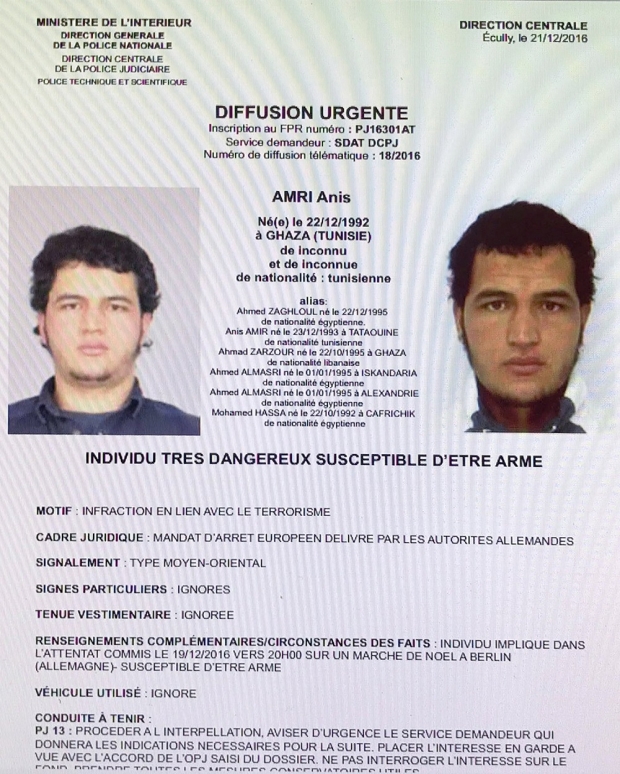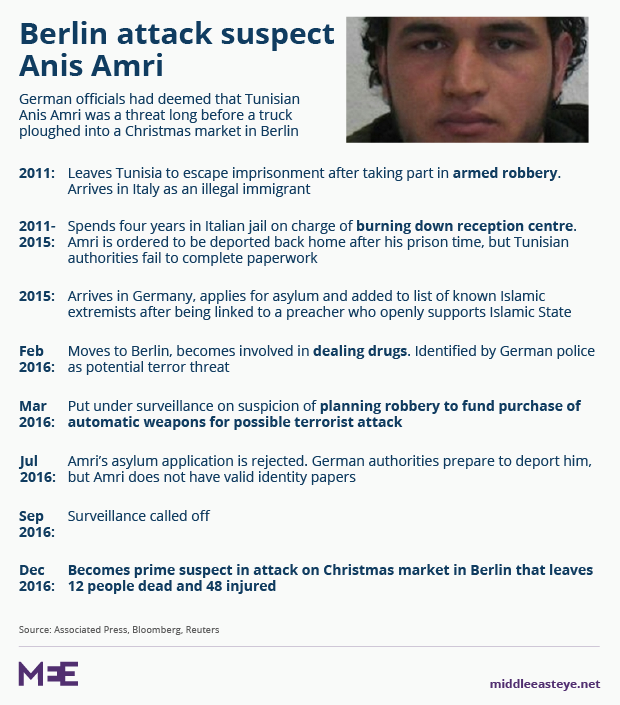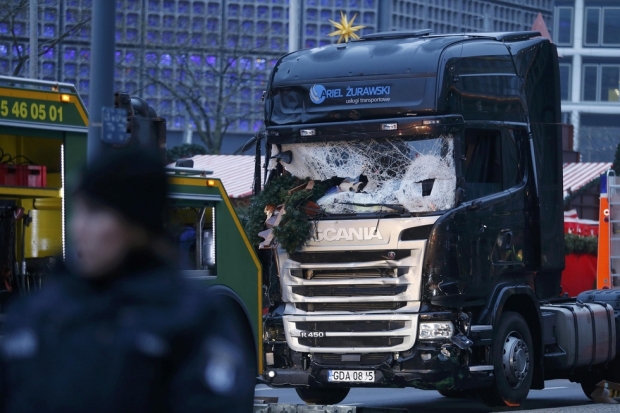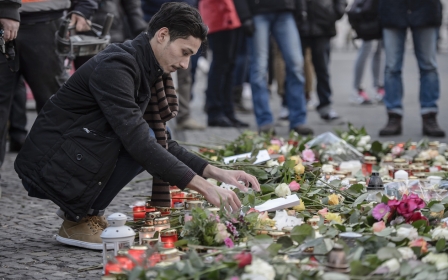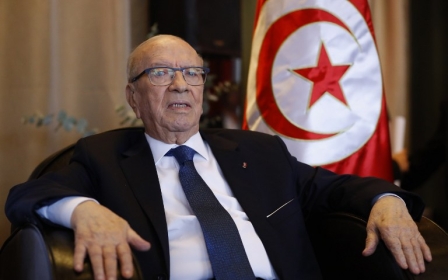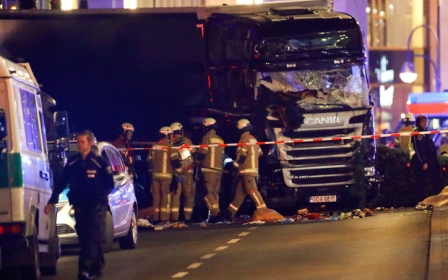Berlin attack: 'High probability' Tunisian suspect to blame - police
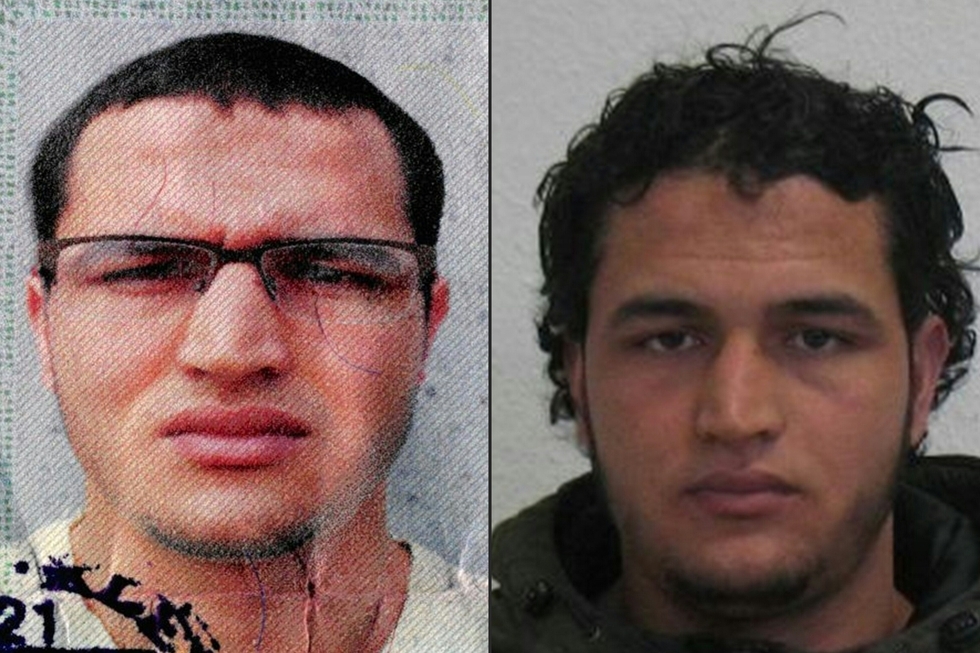
A Europe-wide search is under way for a Tunisian man wanted for the lorry attack on a Berlin Christmas market, as reports emerged that he was a convicted criminal who had been under surveillance in Germany earlier this year for planning a robbery to pay for firearms.
German authorities warn Anis Amri, 24, could be armed and dangerous and are offering a reward of up to €100,000 ($104,000) for information leading to his arrest - a rare move by German police. Monday evening's attack on the market in Berlin killed 12 and injured 49 others. Among the confirmed dead were six Germans and an Israeli woman.
A police notice lists six different aliases used by Amri, born on 22 December 1992, who at times tried to pass himself off as an Egyptian or Lebanese national. Several German media outlets on Thursday said Amri's fingerprints had been found on the door of the truck that ploughed through the crowds.
German investigators believe there is a "high probability" that the Tunisian suspect they are hunting in connection with Monday's attack on a Berlin Christmas market is the perpetrator, German interior minister Thomas de Maiziere said on Thursday.
"We can report today that we have new information that the suspect is with high probability really the perpetrator," de Maiziere told reporters.
"In the cab, in the driving cabin, fingerprints were found and there is additional evidence that support this," he added.
Chancellor Angela Merkel, appearing alongside de Maiziere at the federal office of criminal investigation, said she hoped the perpetrator would be arrested soon.
She said she was proud of the calm public response to the deadly attack: "In the past few days I have been very proud of how calmly most people reacted to the situation.”
"I am certain we will meet this test we are facing," she added.
Amri had served four years in jail in Italy for violent crimes and theft before entering Germany in July 2015. He had been added to Germany's central terrorism watchlist in January and lost his claim for asylum in June but was not deported to Tunisia.
He was placed under surveillance in March suspected of preparing “a serious act of violence against the state”, which reports said was a robbery to finance a gun attack.
READ MORE: Tunisia needs a deradicalisation strategy for returning 'terrorists'
However, monitoring was lifted in September due to lack of evidence - Amri had been seen allegedly dealing drugs and brawling in a bar but nothing else, reports said.
Amri "slipped off the radar" until his asylum papers for a stay of deportation were found in the cab of the lorry used in the market attack.
The widening of the hunt across Europe came after German police commandos raided two flats in the Berlin district of Kreuzberg late on Wednesday but did not find Amri, Die Welt newspaper reported.
De Maiziere said Amri was being sought in Germany and across Europe’s border-free travel zone.
German newspapers criticised the intelligence services.
Suddeutsche Zeitung argued the authorities "had fallen asleep", while Der Spiegel said on its website that “they had him in their crosshairs and he still managed to vanish".
Bild said in a comment piece that such suspects had to be locked up and "not allowed to roam free".
Amri was reportedly linked to Ahmad Abdulazziz, also known as Abu Walaa, an Iraqi-born preacher based in the German town of Hildesheim who was arrested in November.
In Tunisia, Amri's family expressed shock on Wednesday when they were questioned by anti-terrorism police and learned that Amri was wanted across Europe.
"I can't believe my brother could do such a thing," his sister Najoua told the AFP news agency.
"He never made us feel there was anything wrong. We were in touch through Facebook and he was always smiling and cheerful."
His brother, Abdelkader, said: "When I saw the picture of my brother in the media, I couldn't believe my eyes. I'm in shock, and can't believe it's him who committed this crime".
But, he added, "if he's guilty, he deserves every condemnation. We reject terrorism and terrorists - we have no dealings with terrorists."
Bel Trew, a journalist for The Times, said on Twitter that Amri's father told her that his son had been anything but a pious Muslim prior to becoming "radicalised":
In a sign of defiance, Berlin was set to reopen the Christmas market at the central Breitscheid square where the articulated truck cut a swathe of death and destruction through the festive crowd.
Organisers said they would dim the lights and tone down the Christmas music but begin serving mulled wine and open the traditional market huts, as Berliners left a sea of flowers and candles at the site in honour of the victims.
But as the manhunt intensified, questions surfaced about how the suspect had been able to slip through the net, avoiding arrest and deportation despite being on the radar of several security agencies.
"The authorities had him in their crosshairs and he still managed to vanish," said Der Spiegel weekly on its website.
The top-selling daily Bild's front page headline screamed "Deportation Failure!" while local tabloid B.Z. said starkly "They knew him. They did nothing" next to a photo of the heavyset, dark-haired Amri.
Conservative lawmaker Stephan Mayer, a critic of Chancellor Angela Merkel's liberal stance on asylum, told public radio that the case "held up a magnifying glass" to the failings of her migration policy.
But Armin Laschet, a deputy leader of Merkel's Christian Democrats, placed the blame with regional security authorities, calling their failure to keep tabs on Amri "shocking".
Middle East Eye propose une couverture et une analyse indépendantes et incomparables du Moyen-Orient, de l’Afrique du Nord et d’autres régions du monde. Pour en savoir plus sur la reprise de ce contenu et les frais qui s’appliquent, veuillez remplir ce formulaire [en anglais]. Pour en savoir plus sur MEE, cliquez ici [en anglais].


